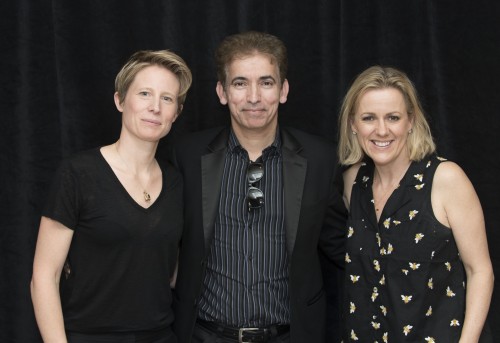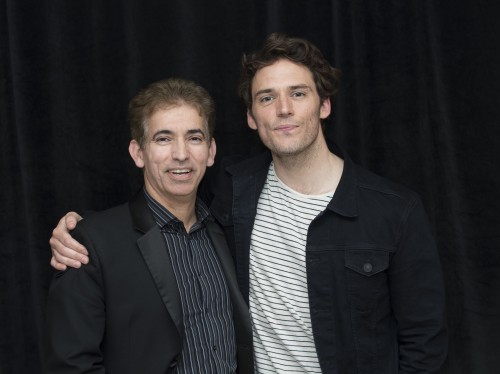
Since its opening last week, the tearjerking romantic drama “Me Before You,” has been decried by the disabled as a false and misleading depiction of their lives and desires, insisting that death is not a wish they contemplate as a solution to their predicament, as the film suggests, and calling on Hollywood to cease perverting their stories for the sake of manufacturing weepy romantic tragedies for the masses.
Based on Jojo Moyes’ bestselling book of the same name, “Me Before You,” tells the story of a 30 year-old investment banker and adventurer, Will Taynor (Sam Claflin), who becomes a helpless quadriplegic, trapped in a wheelchair in his aristocratic parents’ mansion, after he was hit by a speeding motorbike, and endures bouts of excruciating pain and severe depression, that induces him to apply for assisted suicide in Switzerland. To dissuade him from his plans, his parents hire a cheerful waitress, Lou Clark (Emilia Clark), to entertain him and elevate his morbid mood.
On a dramatic level, the film achieves its goal in breaking our hearts and moistening our eyes, but once the end credits begin to roll and we wipe out our tears, emotions cede to reason and troubling questions spring to our minds: Can the disabled lead a fulfilling, dignified life? Is death an appropriate resolution out of his health predicament? Does he have the right to decide his fate and pass a death sentence on himself?
These are the questions that have irked the disabled community, who stress that their lives are as fulfilling as those of the abled people, and that they are actively involved in all professional fields, and contribute to their societies and to the advancement of humanity. Disabled people have been leaders of nations, corporation and institutions, great thinkers and accomplished scientists, such as the famed astrophysicist Stephen Hawking, who, like Will, is a wheelchair-bound quadriplegic, but in his biopic “The Theory of Everything (2013),” we witness him overcoming the restriction of his debilitating disease, with the encouragement of his loving wife, and rising to the pinnacle of his profession, with scientific contributions far exceeding those of his abled colleagues. Hawking, though, has admitted that he did favour death in the early 80s, following a deterioration in his health, that prevented him from breathing on his own. But his untamed desire to unlock the mysteries of the Universe spurred him to live.
In an interview in New York, just before “Me Before You” premiere there, I posed these concerns to the book’s author, Moyes,

the film’s director, Thea Sharrock, and its two leads, Sam Claflin and Emilia Clarke, who all expressed their deep sympathy with the disabled and stressed that their aim in making the movie was to shed light on their plight. Furthermore, each one of them had visited hospitals, where they met quadriplegics and learned about the hardship and challenges they face on a daily basis, while prepping for the movie.
“It was honestly the most inspiring research or preparation or process that I had ever been through,” says Claflin, who would go home in the evening and sob in his wife’s lap after each hospital visit. “It was the most eye-opening, the most insightful and most effective. It really moved me meeting people and hearing so many stories that were so inspiring, so many positive stories, as well as negative ones of course. So I kind of got and gained as much information as I could before putting it to play.”
Clark, who has also attended forums for caregivers in order to garner an understanding of the quadriplegics’ daily needs, echoes Claflin’s sentiment. “The most enlightening and grueling part of it is that it’s not like they’re in hospital and they get better,” remarks the “Games of Thrones” star, who, for the first time since the onset of her career, plays a jovial character, like herself. “I do more acting on “The Game of Thrones” than I did in this one,” she laughs.
Moyes, on the other hand, had no need to invest much time on research when she embarked on writing “Me Before You.” Instead, she relied on her experience with her disabled relatives and friends. “Two of my relatives were quadriplegic and needed 24 hour care. A close friend spent two decades in a wheelchair, and through them I experienced how do you interact with your surrounding when you’re disabled,” explained the 46-year-old author, who later joined Sharrock on her visit to hospitals and met with patients and their doctors.
“I actually have a nephew, who is eighteen now and he has been in a wheelchair since he was fifteen, and it means the world to me that when he sees this movie, I don’t want it to cross his mind that something might not be authentic and correct. So we have put a lot of time into it,” adds Sharrock.
It’s evident that the meticulous research and prudent prepping have contributed to delivering an authentic and truthful depiction of the physical, social and mental challenges, that the disabled have to face daily, yet it doesn’t draw us any closer to empathising with Will’s intransigence on ending his life, particularly when his parents have dedicated their lives and their seemingly limitless wealth and resources to his needs and comfort. And in addition to Clark’s heavenly presence in his life and her unconditional love for him, a nurse was always available to ensure his wellbeing.
“Will is constantly in a lot of pain, but we don’t see that, because he wouldn’t let Lou see that, so the audience shouldn’t see that either,” Claflin offers.
Granted, but this kind of pain is endured by every disabled person, yet they don’t succumb to it and give up on life. To the contrary, in many cases, it becomes the fuel that, not only spurs them to live, but propels them forward to achieve greater goals than their able-bodied fellows can only dream of, such as the US president FDR Roosevelt, whose polio-induced paralysis failed to impede his ambitions to reach the White House and lead his nation to victory in the Second World War, or the aforementioned Hawking, whose theories have brought humanity closer to the unlocking of the mysteries of our Universe, or the deaf-blind Helen Keller, who authored several books and campaigned tirelessly for women’s suffrage in the early twenties last century.
Those are the stories of triumph that ought to be told in order to inspire and empower anyone who is unfortunate to be afflicted by a debilitating disability, not the dispiriting accounts of Will, who clearly possesses a vast mental and intellectual capacity to forge a path in life that could contribute to improving the lives of others and reaching high goals, which would fill his loved-ones’ hearts with joy and pride, instead of breaking them with agonising sorrow over his departure. Hence, one could justly argue that Will is just self-centered and selfish.
“I think he is a selfless guy,” 29-year-old Claflin counters. “He is seeing his parents sacrificing their happiness to make him happy, which kills him inside. Then he sees Lou able to spread her wings, but she is looking after him on a daily basis, so in his mind he was doing a selfless act.”
Indeed, according to the Swiss euthanasia center, Dignitas, the vast majority of those who apply for assisted suicide do so because they are tired of being a burden on others. Even Hawking himself has admitted in a BBC interview that he would have choosen to die if he had felt that he was a burden on others.
This is actually a dangerous justification for seeking death as a solution out of a health predicament, because it was the same reasoning behind the Nazi’s mass executions of the disabled, for they regarded them a burden on the nation.
Moyas admits though that during her research, she learned that only a small minority of quadriplegics apply for euthanasia, and those were the patients that she wanted to explore in her book and understand the circumstances that drove them to make such an unshakable decision. “I don’t have a personal position and I am struck as a writer by the grey areas in life, and the questions to which we can find no answers. If it was me, I would love to think that I would find a way forward and I would be happy to do that and I could be there for my children, but I don’t know, because it’s an extraordinary situation to find yourself in and I guess what we really wanted to convey in the movie was that you can’t judge someone for their decision and unless you sat there and been in their shoes, you can’t judge somebody, because it’s extreme.”

The reality is that practicing euthanasia is illegal except in few countries such as Switzerland, Belgium and The Netherlands. Therefore, Will had to visit Dignitas in Switzerland in order to achieve his goal. He also had to prove that his paralysis was untreatable and death was the only the path out of his painful existence. Reportedly, Digitas receives hundreds of daily euthanasia applications, but the majority of them are rejected, for they do not fulfill the strict legal requirements undergo this process.
“Everybody has an opinion on it and after making this movie I now have an educated view on it which I think is very different to just having an opinion,” says Clark. “The brilliance of what we are talking about in this movie is that everyone has a right to choose so I think we’re all fortunate enough to have in the western world this right and so that’s that.”
This is another disturbing statement, because many of those who seek assisted suicide don’t suffer from any physical incapacities; they are merely mentally troubled and hopelessly bored of their lives. So is it right to fulfill their requests to kill themselves? And is the freedom of individual choice medically valid in these circumstances?
The filmmakers seem to side with Will’s choice, but the debate on the validity and legitimacy of euthanasia continues to rage in parliaments, courts of law and religious forums. Even in the medical field, opinions are evenly divided. Studies have shown that 44% of doctors in the US support the practice of euthanasia in extreme medical conditions, while 46% of them reject it completely.
The controversy that “Me Before You” has ignited prompted Moyas to write a sequel, in which Will may change his mind about ending his life. “These characters never left me and the question I kept asking myself is what would be the aftermath of being involved in a situation like that and I am kind of wary of saying too much about what the situation is for those who haven’t read or haven’t watched it, but I did not feel that character would be able to sail off into the sunset without a backward look. And so for me after you began as an exploration of that with, I don’t know, I threw a little bomb into the mix as well,” the author smiles.